Thank you for reading this post, don't forget to subscribe!
Trips Into History explores the automotive industry during the years of the Great Depression and highlights a few of the marvelous cars produced and sold during this era of financial crises.
At first take you might wonder how some of these automakers stayed in business during this period. Indeed some auto manufacturers did suffer and some did go out of business. Some of these companies survived only because they took steps to adapt to a bad economy.
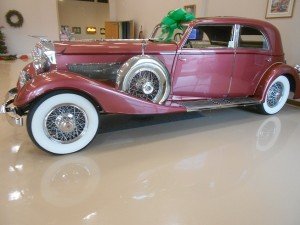
While employment got worse automobile prices in general decreased. Against this backdrop there were those who could afford a luxury automobile and they were built and sold. Below are some of those luxury cars that did sell and sold in perhaps small numbers yet good numbers for the period and the price asked.
The 1933 Dusenberg Model J
It’s commonly said that each of the Duesenbergs were built differently. This is because while Duesenberg built the chassis and the engine, the body and styling was completed by some of Europe’s and America’s most noteworthy coach builders. With different coach builder involved it was easy to have noted differences. At the same time, having your car crafted by top end coach builders drove the prices quite high.
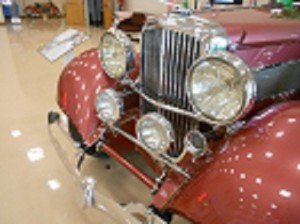
In 1933, prices ranged from about $13,000 to $25,000 depending on the extent of the hand crafted coach building. In fact, the degree and type of coach building completed on Duesenberg models are why average prices during today’s auctions are as high as they usually are.
The prices charged for a new Duesenberg in 1933 were an enormous amount of money during the depths of the Great Depression. You would wonder why anyone would pay that price for an automobile during that era but they did. Some of the Duesenberg owners during the 1930′s included top Hollywood celebrities and European royalty. These were the types of buyers who surfaced with other luxurious and expensive automobiles.
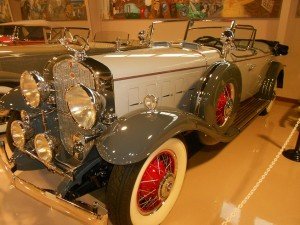
This was not an inexpensive automobile. During the Great Depression of which 1931 was certainly a part of, the Cadillac V-16 was the car of choice for the wealthy and celebrities.
Clearly, Cadillac’s V-16 was meant to make it competitive in the luxury high price end that automakers like Peerless, Pierce-Arrow and Packard held sway. The body for all 1931 Cadillacs were longer and lower than previous models. They also had a longer hood. The 1931′s also had a chrome plated screen that covered the radiator.
You could say it was the right kind of luxury car at just the wrong time. A total of 3,250 V-16′s were produced by Cadillac during the years 1930-1931. The price tag for a new Cadillac Sixteen could reach around $10,000. This was a high price vehicle in both the 1930′s and 1940′s. With the financial situation as it was in 1931, $10,000 or thereabouts was a huge amount of money to pay for an automobile.
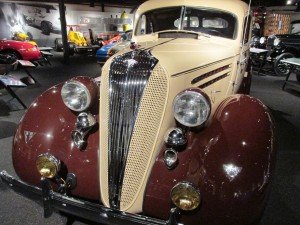
The 1936 Hudson Deluxe Eight
Whenever you look at vintage automobiles from the mid 1930′s there usually are some interesting stories to go along with them. The 1930′s was a time of change for the auto industry. The nation was in the throes of the Great Depression and automakers in general were struggling.
Much to their credit, Hudson automobiles were known for quality and for introducing a lot of firsts. The firsts included the steering wheel being placed on the left side of the vehicle with hand controls in the center. Dual brakes were yet another first as well as the first balanced crankshaft used in their straight six engine.
The 1936 Hudson’s new car price wasn’t anything like Dusenberg and Cadillac but was around $1,000 to $1,300. You might be able to buy a Ford during this period for about $800.
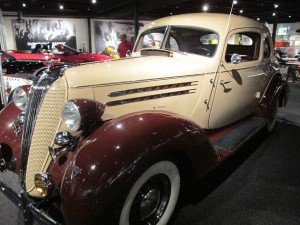
The Hudson Motor Car Company operated from 1909 to 1954. This was along run and under all manner of financial conditions. Hudson was one of the survivors of the Great Depression. They kept costs in line with sales. In 1954 the company merged with Nash-Kelvinator which was the precursor to the new American Motors.
After the 1957 model year the name Hudson was dropped. The Hudson brand had a successful forty-eight year run and again was always noted for quality.
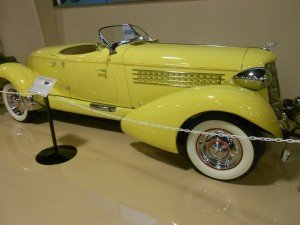
The 1935 Auburn Boat Tail Speedster
The Auburn Automobile Company was affected quite deeply by the Great Depression. To make matters worse, E.L Cord, the former Chicago car salesman turned automaker president, was under fire for alleged mismanagement as well as questionable stock dealings. Auburn found itself with an acting president in 1935 by the name of Harold T. Ames.
The Auburn BoatTail Speedsters such as the one shown here offered both eye catching design as well as performance. The car looked like a race car and perhaps it was. Because of the company’s lackluster sales performance, the Speedster was intended to spark excitement among the performance car buying public and bring in much needed cash.
As a result of this Auburn produced a newly designed 1935 eight cylinder turbo-charged Auburn Speedster. Indeed, the car was an eye catcher.
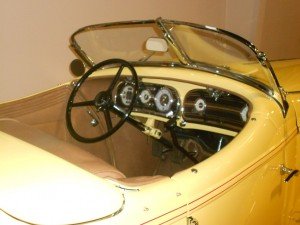
With new engines becoming available every few years, there were three different generations of the Auburn Speedster built from 1928 to 1937. All Auburns, prior to 1935, were built with Lycoming twelve cylinder engines.
Two good books on the subject of automobiles of the 1930’s include American Cars of the 1930s by the Olyslager Organization and Cars of the Classic 30’s by the Auto Editors of Consumer Guide.
Below are links to some of our additional photo articles on our AutoMuseumOnline and Western Trips sites you’ll find interesting.
The 1931 Cadillac V-16 Sport Phaeton
The 1935 Auburn Boat Tail Speedster
A Unique Classic Car Museum in Endee New Mexico
The Studebaker National Museum
Prices of these Luxury Cars Today
As we’ve demonstrated, the price tags for the cars featured above were considered quite high during the 1930’s. Today, some of these automobiles, depending on degree of restoration and the current financial climate, can receive auction bids from collectors in the hundreds of thousands of dollars. Even over one million dollars.
A 1933 Dusenberg SJ model can receive a bid perhaps over $2 million. This was a vehicle with over 300 horsepower in 1933. A fantastic amount of power under the hood in the 1930’s.
A 1931 restored Cadillac Sport Phaeton was sold at auction for over $200,000.
A 1935 Auburn Boat Tail Speedster fetched over $550,000 at auction.
Car auction activity shows that a restored 1936 Hudson Eight Coupe sold for about $25,000.
All of the above automobiles are rare finds. Finely restored is even rarer.
(Article and photos copyright AutoMuseumOnline)
